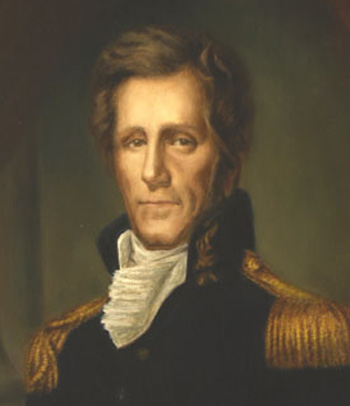
|
Andrew Jackson |
 |
|||
| Rank, Service | ||||
Major General, U.S. Army |
||||
| Veteran of: | ||||
|
||||
| Tribute: | ||||
Andrew Jackson was born on March 15, 1767, in the Waxhaws area of South Carolina. In 1780, at the age of 13, Jackson joined a local regiment of the Continental Army as a courier. Both he and his brother Robert were captured by the British and held as Prisoners of War. Jackson later worked as a lawyer and was on the delegation to the Tennessee Constitutional Convention in 1796. He served as the first U.S. Representative for Tennessee and was later a U.S. Senator from that state. He resigned his Senate seat in 1798 and was appointed a judge on the Tennessee Supreme Court the same year. In 1801, Jackson was appointed commander of the Tennessee Militia with rank of Colonel. During the War of 1812, Jackson commanded the American forces to a victory against the Red Stick Creek Indians at the Battle of Horseshoe Bend in 1814, and again against the British at the Battle of New Orleans on January 8, 1815. At the Battle of New Orleans, Jackson's 4,000 militiamen won a total victory over 10,000 trained British soldiers. The British had over 2,000 casualties to the American's 13 killed and 58 wounded. During the First Seminole War, Jackson fought against the Seminole and Creek Indians, and invaded Spanish Florida. He served as Military Governor of Florida from March to December 1821. Jackson was again elected to the U.S. Senate from Tennessee and served from 1823 to 1825. He was elected the 7th President of the United States and served from 1829 to 1837. Andrew Jackson died on June 8, 1845, and was buried at his home, The Hermitage, near Nashville, Tennessee. He was the first American President to have been a POW during war after the United States gained its independence and the last President to have been a veteran of the American Revolutionary War. |
||||
|
||||

